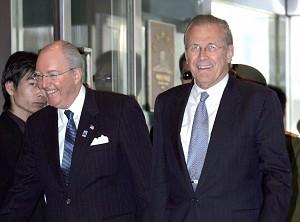BEIJING ― U.S. Defense Secretary Donald Rumsfeld flew into China on Tuesday for a meeting with key officials military officials.
Rumsfeld ― who on his last trip to Asia publicly raised concerns about China's rapidly growing military spending, drawing an angry Chinese response ― said China, with its rising regional and global clout and fast-growing economy, was a country “we would like to see engage the world, as they are, in a peaceful and constructive way”.
Washington hopes to increase military-to-military exchanges, which have lagged behind economic and political relations because of mutual wariness that intensified after the collision of a U.S. spy plane and a Chinese fighter jet in 2001.
China is also hoping Rumsfeld's visit will improve relations, a Chinese foreign ministry spokesman, Kong Quan, said on Tuesday. “We hope this visit will enhance Chinese-US relations, especially between the militaries,” he told reporters.
Rumsfeld, in a major speech in Singapore in June, said China, after years of double-digit military budget growth, was upsetting the balance of power in Asia, where the United States maintains key alliances with South Korea and Japan.
The Pentagon amplified those concerns in a report in July, warning that China's build-up, including a growing arsenal of more than 500 missiles deployed against Taiwan, could threaten the self-ruled island, which Beijing claims as its own.
Watching China's Military Growth
On Tuesday, Rumsfeld declined to expound upon his Singapore speech or the Pentagon report, but said the United States was not alone in watching China's military growth.
“It's interesting that other countries wonder why they would be increasing their defence effort at the pace they are and yet not acknowledging it,” he said.
China rejects claims that its military spending is too secretive. In recent years, China has publicised its military policies and budget through a series of white papers, foreign ministry spokesman Kong said. “The outside world's understanding of China's national defence is steadily expanding,” he added.
Rumsfeld, making his first trip to China as U.S. defence chief, is expected to spell out his views on China at a speech on Wednesday at the Central Party School, the top training facility for the communist leadership. He will also address a military think-tank on Thursday.
He characterised his two-day visit as a “part of a pattern” of deepening bilateral ties and noted that President George W. Bush also plans to visit China in November.
Rumsfeld said he hoped to sound out his Chinese counterpart, Cao Gangchuan, about increasing military exchanges and visits.
“I'm interested to see what they would like to do,” he said.
Through exchanges and engagement with China, Rumsfeld said, “the world then has a chance to see how they plan to chart their path and their course in the months and years ahead”.
The Pentagon has long hoped to encourage China to reciprocate the access to defence facilities which the United States grants visiting Chinese delegations.
On Wednesday, Rumsfeld will visit China's Second Artillery Corps, a strategic missile facility at Qinghe outside Beijing, a first for U.S. officials.
U.S. requests to tour “China's Pentagon” in the Western Hills outside the Chinese capital were denied, U.S. officials said.
Rumsfeld said he wanted to discuss ways China could help in the U.S.-led war on terror and how Beijing could ensure that North Korea sticks to commitments made at six-party talks last month aimed at ending its nuclear programmes.
“We obviously believe that the People Republic of China's influence with North Korea is the greatest of the participants and are hopeful that they're able to use their influence constructively,” he said.
Rumsfeld's week-long trip also includes South Korea, Mongolia, Kazakhstan and Lithuania. Additional reporting by Chris Buckley in Beijing





